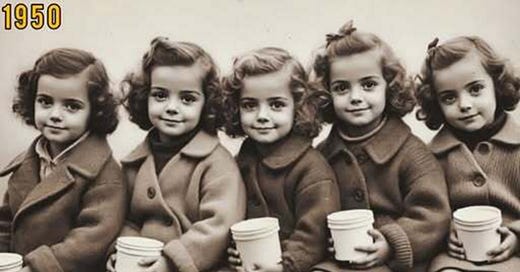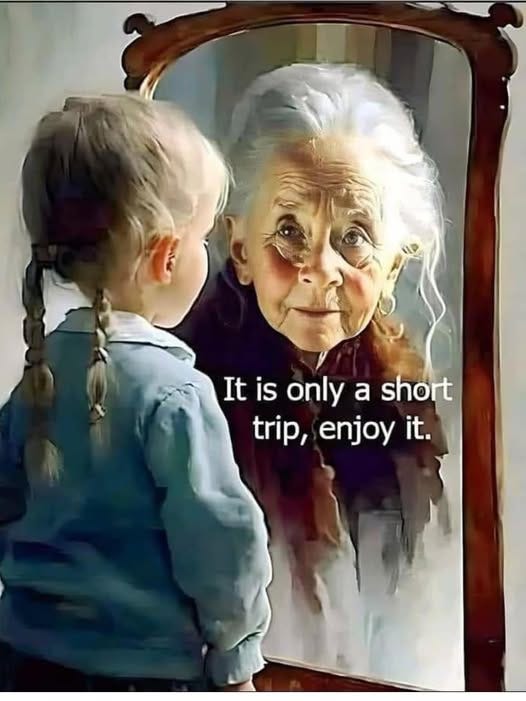Pictures like this regularly beam in from cyberspace. I find them poignant and riveting, even unsettling. Why unsettling? I’m not sure. I look at them, shake my head in wonderment. How can it be? Are those cute little four-year-old girls the same people today? They must be eighty.
Here’s another. The baby is now forty-five. But the mother. The mother. A fresh-faced young woman of say 25, is now a seventy-year-old in a wheelchair: gray and unrecognizable.
Can they really be the same people? Why are these images so captivating? Why do they bother me? I need to get a handle on it.
How about this one?
Seventy years takes its toll. I’d like them to stay in 1985, in the full flush of midlife. I remember 1985. I wouldn’t mind being there, myself.
This next picture is particularly striking.
The dates on this must be wrong. Nevertheless, it’s startling. The mom is just too attractive to have ever gotten so old. It just can’t be. Crawling caterpillars blossom into bright, beautiful and colorful butterflies; humans transform in the other direction, from butterflies to gray caterpillars.
Why does this bother me? Probably because I’m of a certain age. Because I can’t go back and do it again? Because of all the things I’ll never know? Because all of this is the childhood of eternity, and I won’t be able to see it all? Regrets about the road not taken? Because of the long dark night that taunts us all?
To the young, old age is the dark continent of life, a place we do not want to explore. It looms up there – gray infirmity preceding black infinity.
What is it really like – that unknown country over the hill, where memories are in abundance and energy a premium, where aches and pains and doctors invade our once vigorous world; where we sit and wonder how it could have gone so fast? Listen to the voices of the old. They livethere now.
OLD AGE IS A SURPRISE
In his later years, Paul Newman was shown a picture of himself at age thirty. He laughed and said, “Is that really me?” He seemed more amused than surprised.
· Polly Francis, writing in her nineties, called it “baffling.” “It is often with shock that we become aware of its presence.” Like so many of the elderly, Francis wrote, “I want to cry out that the invisible part of me is not old.”
· French writer, Maurice Goudeket, wrote that his reaction to turning seventy-five was “astonishment.”
· Malcom Crowley wrote, “…old age is only a costume assumed for those others; the true, essential self is ageless.” His heart, he said, “has remained so young that I have the continual feeling of playing the part of the seventy-year-old.”
DIFFERENT
The old will tell you it’s not what you thought it was going to be. “To enter the country of old age,” wrote Cowley, “is a new experience, different from what you’ve supposed it to be. Nobody, man or woman, knows the country until he has lived in it and has taken out his citizenship papers.”
YOUTH WAS NOT SO GREAT
The old also say that youth is not so great. “Youth is the season of tragedy and despair,” wrote Ellen Glasgow. “Youth is the time when one’s whole life is entangled in a web of identity, in a perpetual maze of seeking and finding, of passion and disillusionment, of vague longings and of nameless griefs…”
In old age, perhaps for the first time, you know who you are. “During much of my life,” wrote 83-year-old Elizabeth Coatsworth, “I was anxious to be what someone else wanted me to be. Now I have given up that struggle. I am what I am.”
Seventy-year-old Mary Sarton wrote, “…I am more myself than I have ever been. There is less conflict. I am happier, more balanced and…more powerful.” She never feared old age, but “longed” for it “because all my life I have had such great examples of old age, such marvelous models to contemplate.”
WONDER
The word wonder crops up time and again in the musings of the old. When we are old, we can finally slow down long enough to appreciate the wonders of life. For Goudeket, “every fresh day finds me more filled with wonder and better qualified to draw the last drop of delight from it. For up until now I had never known time’s inexpressible wealth; and my youth had never entirely yielded itself to happiness.”
Coatsworth, wrote, “I seem to be awakening to a larger world of wonderment – to catch a glimpse of the immensity and diversity of creation. More than any other time in my life, I seem to be aware of the beauties of our spinning planet and the sky above.”
Archibald MacLeash put his wonder to verse.
At twenty, stooping round about,
Truth a trick, faith a doubt.
Little beauty, less grace.
Now at sixty what I see,
Although the world is worse by far,
Stops my heart in ecstasy.
God the wonders that there are!
Psychologist, Carl Jung said in old age, “there is so much that fills me: plants, animals, clouds, day and night, and the eternal in man.”
GRATITUDE
When Oliver Sachs was dying he wrote:
“My predominant feeling is one of gratitude. I have loved and been loved. I have been given much and I have given something in return. Above all, I have been a sentient being, a thinking animal, on this beautiful planet, and that in itself has been an enormous privilege and adventure.” —Oliver Sacks
To those in the full flush of youth, contemplating clouds and plants is not as satisfying as making their marks on the world, not as exciting as falling in love, not as interesting as exploring new places. But, as Ecclesiastes says, there is a time for all things; old age is a time for rest, reflection and wonder; a time to just be one’s self. “The autumn of life,” wrote Polly Francis, “like the autumn of nature, can bring richness and beauty.”
One might as well have a positive spirit about it because the road we are on only goes in one direction, inexorably to old country.
JUDGEMENT DAY
And then there’s this. Judgement Day. Not by God but by posterity.
If a tree falls in a forest, but no one is there to hear it, did it really make a sound? Philosophy classes have bandied this around for generations. It seems like a futile effort.
Of course it made a sound. Past experience has shown that when trees fall, they make sounds. But if no one heard it, then for all intents and purposes, it did not make a sound.
See what I mean. The debate is futile.
However – If a person lived a full life, but his descendants have no memory of him, did he ever really exist?
Yes, of course he existed. And yet, if no memory remains, then for all intents and purposes was he ever here?
If you don’t think you are going to be forgotten, consider this: according to author, Alex Shoumatoff, three quarters of college student cannot name their grandparents. We would all like to be remembered – at least for a generation or two. But I suspect that the famous and powerful worry about their legacies more than the rest of us, because they will not only be remembered by posterity, but will be judged by it.
History is replete with such people.
· Henry Adams, worried about his life being distorted by future generations, wrote that his autobiography would be a “shield of protection against the grave.”
· When photographer, Brett Weston, turned eighty he burned all the negatives he had accumulated over a lifetime of photography. “Nobody can print it the way I do,” he said. “It wouldn’t be my work.”
“The prints are posterity,” he added, “not the negatives.”
Kings, Pharaohs and billionaires ensure their eternal fame by erecting monuments to themselves.
· The pharaoh, Cheops, caused “all manner of wickedness” to finance his project. He sent is daughter to public brothels. She not only earned money, but required each man to give her a gift of stone which she used for her own pyramid.
· Peter the Great of Russia built St. Petersburgh by forcing his people into slave labor. It was a city of death built on the bones of Peter’s laborers.
· Nicolae Ceausescu, the brutal dictator of Romania, displaced 40,000 people from their homes in 1986 in order to build a monument to the “Ceausescu Era.”
· Ferdinand Marcos erected a huge statue of his head near Manila.
· Donald Trump built hotels, buildings and golf courses.
· Carnegie Hall, Vanderbilt University and Rockefeller Center are monuments to the memories of the super-rich.
And let us not forget Michael Jackson. Not satisfied with mere superstardom, he saw himself as a superstar for all time. When discussing his album, Dangerous, he said, “I wanted to do an album that was like Tchaikovsky’s Nutcracker Suite, so that in a thousand years from now, people would still be listening to it. Something that would live forever. I would like to see children and teenagers and parents and all races all over the world, hundreds and hundreds of years from now, still pulling out songs and from that album and dissecting it. I want it to live.”
Or more to the point, he wants himself to live - through his work. Jackson admitted he can’t take credit for his music “because it’s God’s work. He’s just using me as the messenger.”
Where does that leave the rest of us? Some photographs? The focus our legacies will not be monuments of stone, but monuments of love. We will be remembered in the hearts and minds of our children. How terrible it would be to be remembered with bitterness.
· My mother was always depressed; she didn’t have time for us.
· My father beat us. He was an unhappy man.
· My mother hated me.
· My father was jealous of my success.
· My dad rarely acknowledged my presence. He was too busy.
· I worked too hard and loved too little.
· My parents hated each other.
· I was too busy to have time for other people
Imagine decades down the road, your child telling your grandchild, “I’ll never treat you the way my parents treated me.”
The greatest monuments to our existence are in the memories we create today. When we are dust, when there is nothing more we can say or do, when the game is over and we are just a stack of old photos in the attic, how then will we be remembered?
We build posterity today.










"You wouldn't worry so much about what others think of you if you realized how seldom they do." ~ Eleanor Roosevelt